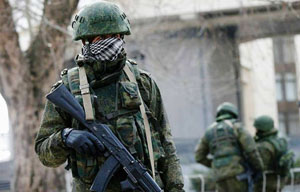Jammu, Nov 27: Eight people, including three civilians, were killed when the security forces took on infiltrating militants in Jammu and Kashmir Thursday, police said.
A fierce gun battle between the security forces and militants began near the international border in the morning and ended around 3 p.m.
Four guerrillas and a soldier were also killed in the gunfight in Jammu district's Arnia area, police said, adding searches are on in the area.
"The group of militants comprising seven to eight fired at a civilian vehicle after they infiltrated into the Indian side in Arnia area of Jammu district. The driver and two occupants of the vehicle were killed in this incident, after which the militants entered an abandoned army bunker in Pind Khote village," a office said.
"Army and the BSF engaged the militants in a sustained gunfight in which four militants were killed. One junior commissioned officer of the army was also killed and four other soldiers were injured," the officer said.
"The infiltration attempt was supported by Pakistan Rangers, who fired mortar shells at BSF (Border Security Force) positions in Arnia Thursday morning so that the militants could sneak in," the officer said.
Chief Minister Omar Abdullah Thursday said the attack "can't be a coincidence" and that he condoled the death of the soldier.
"The timing of the attack in Arnia can't be a coincidence. My condolences to the family of the army officer killed in Arnia," Abdullah wrote on his Twitter handle.
Indian Prime Minister Narendra Modi and Pakistani Premier Nawaz Sharif, along with six other heads of state or government, are Thursday attending the 18th Saarc Summit in Nepal.
Abdullah said all check posts along the national highway in Jammu and other sensitive locations have been placed on high alert.





Comments
Add new comment